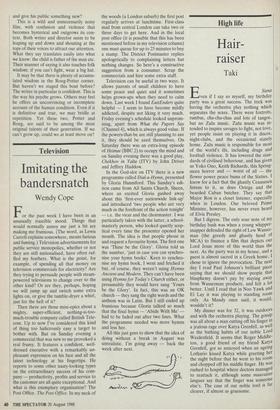Television
Imitating the bandersnatch
Wendy Cope
For the past week I have been in an unusually irascible mood. Things that would normally annoy me just a bit are making me frumious. (The word, as Lewis Carroll explains somewhere, means furious and fuming.) Television advertisements for public service monopolies, whether or not they are still nationalised, have often ruf- fled my feathers. What is the point, for example, of spending all that money on television commercials for electricity? Are they trying to persuade people with steam- powered televisions to change over to the other kind? Or are they, perhaps, hoping we will jump up and switch some extra lights on, or give the tumble-dryer a whirl, just for the hell of it?
Then there are those mini-epics about a mighty, super-efficient, nothing-is-too- much-trouble company called British Tele- com. Up to now I've considered this kind of thing too ludicrously easy a target to bother with. But on Sunday evening a commercial that was new to me provoked a real frumy. It features a confident, well- dressed executive with a remarkably un- pleasant expression on his face and all the latest technology at his fingertips. He reports to some other nasty-looking types on the extraordinary success of his com- pany — productivity, profits and service to the customer are all quite exceptional. And what is this exemplary organisation? The Post Office. The Post Office. In my neck of
the woods (a London suburb) the first post regularly arrives at lunchtime. First-class mail from central London can take two or three days to get here. And in the local post office (it is possible that this has been mentioned before in my television column) one must queue for up to 25 minutes to buy a stamp. The District Postmaster replies apologetically to complaining letters but nothing changes. So here's a constructive suggestion from a consumer. Scrap the commercials and hire some extra staff.
Television can be useful in two ways. It allows parents of small children to have some peace and quiet and it sometimes helps grown-ups when they need to calm down. Last week I found EastEnders quite helpful — I seem to have become mildly addicted, despite not liking it very much. Friday evening's schedule looked unprom- ising, apart from What the Papers Say (Channel 4), which is always good value. If the powers-that-be are still planning to axe it, they should be axed themselves. On Saturday there was an extra-long episode of Heimat (BBC 2) to occupy the mind and on Sunday evening there was a good play, Chekhov in Yalta (ITV) by John Driver and Jeffrey Haddow.
In the God-slot on ITV there is a new programme called Dial-a-Hymn, presented by Gloria Hunniford. This Sunday's edi- tion came from All Saints Church, Sheen, where an excited Gloria gushed away about this 'first-ever nationwide link-up' and introduced 'two people who are very much in the forefront of the action tonight' — i.e. the vicar and the choirmaster. I was particularly taken with the latter, a school- masterly person, who looked quietly scep- tical every time the presenter opened her mouth. The idea is that people phone in and request a favourite hymn. The first one was 'Thine be the Glory'. Gloria told us the number, 'just in case you can synchro- nise your hymn books'. Keen to synchro- nise my hymn book, I went and fetched it but, of course, they weren't using Hymns Ancient and Modern. They can't have been using Hymns for Today's Church either, or presumably they would have sung 'Yours be the Glory'. In fact, this was an OK church — they sang the right words and the anthem was in Latin. But I still ended up frumious because Gloria talked so much that the final hymn — 'Abide With Me' had to be faded out after two lines. What the programme needed was more hymns and less her.
All this just goes to show that the idea of doing without a break in August was unrealistic. I'm going away — back the week after next.






















































 Previous page
Previous page